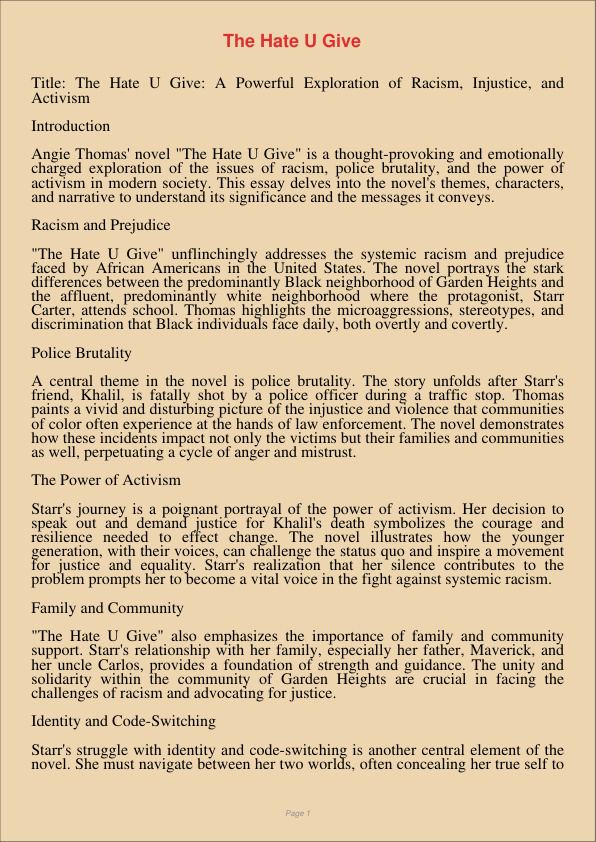The Hate U Give
Jan 9, 2024
hate u give
Philosophy
Religion and Theology
Title: The Hate U Give: A Powerful Exploration of Racism, Injustice, and Activism
Introduction
Angie Thomas’ novel “The Hate U Give” is a thought-provoking and emotionally charged exploration of the issues of racism, police brutality, and the power of activism in modern society. This essay delves into the novel’s themes, characters, and narrative to understand its significance and the messages it conveys.
Racism and Prejudice
“The Hate U Give” unflinchingly addresses the systemic racism and prejudice faced by African Americans in the United States. The novel portrays the stark differences between the predominantly Black neighborhood of Garden Heights and the affluent, predominantly white neighborhood where the protagonist, Starr Carter, attends school. Thomas highlights the microaggressions, stereotypes, and discrimination that Black individuals face daily, both overtly and covertly.
Police Brutality
A central theme in the novel is police brutality. The story unfolds after Starr’s friend, Khalil, is fatally shot by a police officer during a traffic stop. Thomas paints a vivid and disturbing picture of the injustice and violence that communities of color often experience at the hands of law enforcement. The novel demonstrates how these incidents impact not only the victims but their families and communities as well, perpetuating a cycle of anger and mistrust.
The Power of Activism
Starr’s journey is a poignant portrayal of the power of activism. Her decision to speak out and demand justice for Khalil’s death symbolizes the courage and resilience needed to effect change. The novel illustrates how the younger generation, with their voices, can challenge the status quo and inspire a movement for justice and equality. Starr’s realization that her silence contributes to the problem prompts her to become a vital voice in the fight against systemic racism.
Family and Community
“The Hate U Give” also emphasizes the importance of family and community support. Starr’s relationship with her family, especially her father, Maverick, and her uncle Carlos, provides a foundation of strength and guidance. The unity and solidarity within the community of Garden Heights are crucial in facing the challenges of racism and advocating for justice.
Identity and Code-Switching
Starr’s struggle with identity and code-switching is another central element of the novel. She must navigate between her two worlds, often concealing her true self to fit in at her predominantly white school. This reflects the broader issue of Black individuals feeling the need to adapt their behavior and speech to be accepted in predominantly white spaces, highlighting the need for a more inclusive and equitable society.
Conclusion
“The Hate U Give” is a powerful and moving novel that brings attention to the pressing issues of racism, police brutality, and the importance of activism. Angie Thomas’ compelling narrative and well-developed characters provide readers with a window into the experiences and challenges faced by Black individuals in America. The novel inspires thought and conversation on the urgency of addressing these issues and serves as a call to action for a more just and equitable society. “The Hate U Give” is not just a story; it is a catalyst for change.
